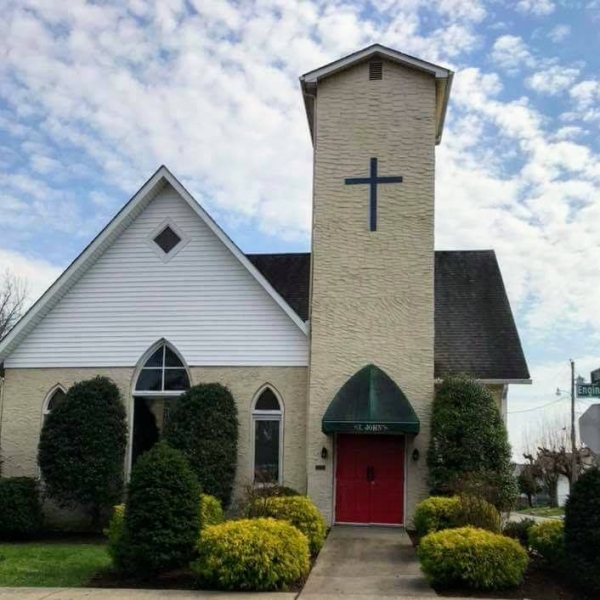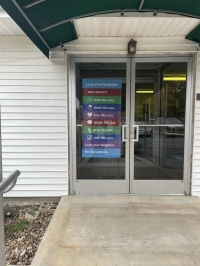Case Study
A small church embraces mutual ministry to build community even without a priest of their own.

St. John’s Episcopal Church, founded in 1898, is a small but vibrant, loving, and proudly inclusive Christian community that believes all people are created by God to model the diversity-in-unity of the Holy Trinity. We are part of the Diocese of Lexington but are located in eastern Kentucky, near some of the poorest counties in our state.
 The town of Corbin spans just under eight square miles and is home to nearly 2,000 families. It is known as the birthplace of Kentucky Fried Chicken, in the original Colonel Sanders Café, but the local economy was historically dependent on coal mines and the development of the L&N Railroad. Corbin has a history of troubled race relations, and our population is still about 97% white. As in many such small towns, more than a third of our families live below the poverty line, with many more hovering just above. Almost half our families with children are headed by single parents. All students are given free breakfast and lunch at school to help the many children living in homes where food is limited.
The town of Corbin spans just under eight square miles and is home to nearly 2,000 families. It is known as the birthplace of Kentucky Fried Chicken, in the original Colonel Sanders Café, but the local economy was historically dependent on coal mines and the development of the L&N Railroad. Corbin has a history of troubled race relations, and our population is still about 97% white. As in many such small towns, more than a third of our families live below the poverty line, with many more hovering just above. Almost half our families with children are headed by single parents. All students are given free breakfast and lunch at school to help the many children living in homes where food is limited.
In a town of many conservative churches, St. John’s stands out for our radical inclusiveness. We are a small congregation of only about 25 people, but we are passionately committed to fulfilling our mission to proclaim the Gospel, promote justice, and prepare a diverse community of seekers to reflect the welcoming love of Christ.
St. John’s has never had the money to pay a full-time priest, and we spent many years struggling to find even part-time clergy who could serve with us consistently. Once or twice a month, the diocese has sent some wonderful supply clergy to provide Eucharist, but we yearn for someone who lives in our immediate area and understands both the joys and the challenges of this unique community. Over the last 7–12 years, we have seen an influx of people with lay leadership experience from larger or more urban parishes, and our parish began to grow even without a regularly assigned clergyperson. In 2017, an interim bishop suggested that we explore the idea of “mutual ministry”: Rather than employing a single priest to run the parish, we would raise up a team of lay leaders who would work together to perform the functions normally done by a priest (worship, formation, outreach, pastoral care, preaching, administration, etc.). We were all very enthusiastic about what this might mean for our small congregation, especially the idea of growing and equipping lay leaders from within our own congregation to help us be the hands and feet of Jesus in our community.
We began this journey by sending a few members to a national conference about mutual ministry and creative leadership. It was incredibly helpful to talk with people and hear real-life examples of congregations using this model of ministry (some for decades!), which gave us a better idea of what to expect and how to start. Our new colleagues talked about focusing on the who instead of the what—not discussing the exact ministry areas we wanted, but figuring out who had what skills, interests, and aptitudes for different kinds of work. They encouraged us to get the whole parish involved in the discussion and allow people to volunteer, but also to encourage nominations, because sometimes others see gifts in us that we might not see in ourselves.
After the conference, our folks returned home brimming with ideas and enthusiasm. It didn’t take long for the whole congregation to catch the vision. We held a “Play and Pray” event where we did some brainstorming and dreaming as a parish. Over the next several weeks, we asked everyone in the congregation to take two different inventories of spiritual gifts to help them start thinking about what they might contribute to this new effort.
By the fall, we had asked eight people to become our initial ministry team, with the idea that eventually parish members would rotate on and off. We started meeting weekly for prayer and formation, and members of the group became quite close. Eventually two candidates from our ranks were recommended to the diocese as possible candidates for ordination.
During this time of transformation, St. John’s was bursting with new energy, which helped draw in several families with young children. We tried several new ideas, some that worked great and some that didn’t, and the ministry team learned to work together and in tandem with the vestry. We were excited to move forward, but our diocese was in a time of transition and we had to wait for a new bishop to be elected and installed.
In 2018, Mark Van Koevering became Bishop of the Episcopal Diocese of Lexington. Bishop Mark was supportive, but he knew it would take time for people in the diocese to fully embrace our unfamiliar model of parish leadership. We met with the diocesan Commission on Ministry several times, and in January 2020 the two ministry team members considering ordination were invited to participate in a diocesan retreat for candidates and postulants. We felt quite hopeful. And then came the pandemic. In March 2020 our governor asked all churches to refrain from in-person worship, and for the next long while we could only gather via online Zoom meetings.
Like many other churches, St. John’s found church to be very different after COVID restrictions lifted. Our elderly parishioners worried for their safety, our ministry team shrank from eight members to six, and we had to rekindle a sense of vitality. It took the better part of a year before we were back into a more-normal routine, and even longer before we started seeing a significant number of visitors and newcomers. Both of our proposed candidates for ordination were officially accepted into the diocesan discernment program, however, and they began working with the bishop and other diocesan staff on requirements for ordination. Our prayer is that both candidates will be ordained deacons in early 2024.
St. John’s continues to be a special place filled with warm and loving people who practice radical hospitality to everyone who comes through our doors. We participate in many outreach programs in our community and look forward to continuing growth and new ideas as we follow Christ and care for one another.